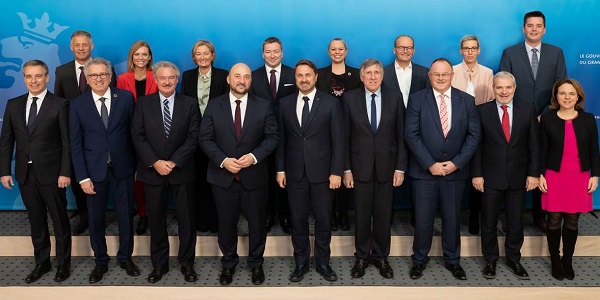 Cabinet ministers;
Credit: © SIP/ Claude Piscitelli
Cabinet ministers;
Credit: © SIP/ Claude Piscitelli
At its meeting on Friday, the Cabinet approved the draft legislation related to the development of studies in the field of medicine at the University of Luxembourg.
The approved draft legislation sets the general framework for the development of university studies specialised in medicine, specifically in the fields of medical oncology, neurology and general medicine, in the Grand Duchy.
Concerning medical oncology and neurology, Luxembourg has increasing needs in the fields of detection, care and treatment of cancer and neurological (neurodegenerative) diseases. According to Luxembourg's Ministry of Higher Education and Research and Ministry of Health, new cancer cases are currently estimated at around 3,000 and neurological diseases at 9,000 per year, with these figures constantly rising in recent years. To care for these patients, there are currently around 25 medical internists or oncologists and 39 medical neurologists in Luxembourg. Within the framework of the targeted training courses, the number of students per year is estimated at three, which should give a total figure of fifteen students for each specialisation. The minimum duration of specialised studies in oncology and neurology is five years.
At present, only general practitioner training is offered at the level of specialised medical studies, in the form of the Formation spécifique en médecine générale (FSMG). Currently, a total of 64 students are enrolled in the three-year programme and around fifteen general practitioners graduate each year. The programme started in 2004 and 115 general practitioners have since graduated.
For the three aforementioned fields, the draft legislation sets the admission conditions and the minimum duration of studies, as well as the number of ECTS credits allocated to the study programmes concerned. While introducing the distinction between theoretical teaching and clinical teaching, it defines the content of the two teaching strands and the targeted learning outcomes, as well as the methods of organising clinical teaching.
Regarding studies in general medicine, this training programme will be fully integrated into the University of Luxembourg's course. The draft legislation provides for the introduction of two types of diplomas, each allowing its respective holder to practice the profession of general practitioner in Luxembourg. The first is a master's degree in general medicine lasting three years, similar to the current specific training diploma in general medicine; the second is a diploma in specialised studies in the field of general medicine, lasting four years. This diploma is placed at level 8 of the Luxembourg Qualifications Framework (CLQ). The result is the need to integrate the research component into the curriculum, in addition to the study programme of the master's in general medicine. Although these are two different study programmes, they share a common core in terms of theoretical training, thus offering doctors in training the possibility to change programme.
In line with the objective pursued by the government to develop university studies in medicine in Luxembourg and improve the attractiveness of the medical and health professions, certain nursing categories shall also be adapted in the near future. To respond to the public health challenges that Luxembourg must face in the next fifteen years in view of the risk of shortage for key professions and to best manage the reorganisation of the medical and nursing resources arising from this, the Cabinet approved the establishment of an inter-ministerial committee responsible for proposing measures to ensure that the training of health professionals is adapted to scientific and technical progress. This adaptation also aims to make it possible to grasp the future challenges of public health which Luxembourg will have to face, define the methods required to ensure the implementation of a Bachelor level diploma for certain categories of nursing and to assess the financial, legal and regulatory consequences.
To this end, a training concept will be developed based on the general BTS-Bachelor transition model as it will be used in the context of the revision of the law on the organisation of higher education and which will allow students who have successfully completed a BTS at LTPS to pursue bachelor studies at the University of Luxembourg.
The inter-ministerial committee will submit its report and a training concept to the Cabinet within six months. In case of agreement, the concept will be submitted to all those concerned.








